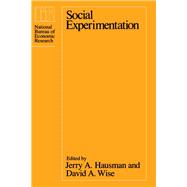
Note: Supplemental materials are not guaranteed with Rental or Used book purchases.
Purchase Benefits
What is included with this book?
| Introduction | |
| The Residential Electricity Time-of-Use Pricing Experiments: What Have We Learned? | |
| Comment | |
| Comment | |
| Housing Behavior and the Experimental Housing-Allowance Program: What Have We Learned? | |
| Comment | |
| Comment | |
| Income-Maintenance Policy and Work Effort: Learning from Experiments and Labor-Market Studies | |
| Comment | |
| Comment | |
| Macroexperiments versus Microexperiments for Health Policy | |
| Comment | |
| Comment | |
| Technical Problems in Social Experimentation: Cost versus Ease of Analysis | |
| Comment | |
| Comment | |
| Toward Evaluating the Cost-Effectiveness of Medical and Social Experiments | |
| Comment: | |
| The Use of Information in the Policy Process: Are Social-Policy Experiments Worthwhile? | |
| Social Science Analysis and the Formulation of Public Policy: Illustrations of What the President "Knows" and How He Comes to "Know" It | |
| Comment | |
| Comment | |
| List of Contributors | |
| Author Index | |
| Subject Index | |
| Table of Contents provided by Publisher. All Rights Reserved. |
The New copy of this book will include any supplemental materials advertised. Please check the title of the book to determine if it should include any access cards, study guides, lab manuals, CDs, etc.
The Used, Rental and eBook copies of this book are not guaranteed to include any supplemental materials. Typically, only the book itself is included. This is true even if the title states it includes any access cards, study guides, lab manuals, CDs, etc.